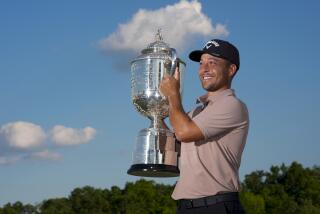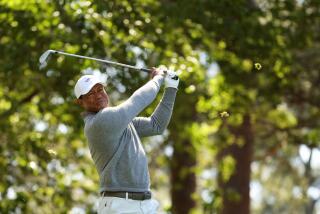To Nelson, PGA Title Is a Snap : Course, Not Gators, Was Only Problem
- Share via
PALM BEACH GARDENS, Fla. — Several alligators were removed from the lakes of the PGA National Golf Club earlier last week by Florida wildlife authorities.
Too dangerous for the golfers, they said.
It might have been more appropriate if they had grown some grass on the greens and used some mowers on the rough.
When the finest shot-makers in the world came down to the final round of the 69th PGA Championship on Sunday, an even-par 72 by former champion Larry Nelson proved enough to win--after a one-hole playoff with Lanny Wadkins, another former champion and Nelson’s Ryder Cup teammate.
Wadkins, who had two double bogeys, five birdies and back-to-back bogeys, finished with a 73.
After the two close friends had tied at one-under-par 287, they went to the 10th hole, where Nelson’s par was good enough to win when Wadkins missed a six-foot par putt.
The winning score was the highest since the PGA switched from match to medal play in 1958.
Nelson won $150,000 for his 70-72-73-72, plus one more par, while Wadkins won $90,000 for his 70-70-74-73 and an extra bogey.
Both players were in the center of the fairway on the playoff hole, Wadkins with a 4-wood and Nelson with a 3-wood.
Wadkins hit his 8-iron approach shot in the right rough. Nelson, also with an 8-iron, put his in the rough on the other side.
Wadkins chipped first and rolled his ball about six feet from the hole. Nelson, faced with a downhill pitch, wound up a foot or so farther from the pin.
“I knew I had to make my putt because I was sure Lanny would make his,” Nelson said.
After he made it, he said it may have been the best putt he ever made. Perhaps he forgot the 45-footer he made at Oakmont to beat Tom Watson for the 1983 U.S. Open.
When Wadkins’ putt slid by the hole on the low side, it was all over.
“I was as surprised as anyone to see him miss that putt,” Nelson said.
Nelson’s win ended the streak of 18 consecutive major championships won by different players. He won the ’83 Open, in addition to his 1981 PGA win.
“This was the most important win of my career,” said Nelson, a balding Georgian who will be 40 next month. “Some players say their first win is the most important, but when you get near 40 you never know if the one you just won will be the last. So right now, this is the most satisfying.”
The penal rough and the crusty and uneven greens were joined by a swirling wind out of the north for the final day. That, plus a 103-degree heat-humidity factor, sent scores soaring.
Raymond Floyd, who started the day one shot out of the lead, shot an 80. Seve Ballesteros, never recovering from a triple-bogey on the third hole, had a 78.
Ballesteros’ 8 on the 533-yard, par-5 third hole may have set the tempo for the day.
It all started when his drive disappeared in the rough. Seve blasted out, then hit his approach shot short of the green, again in the rough. He chunked his fourth shot into the lip of a bunker, from where he blasted out over the green into a lake.
After taking a penalty stroke, he pitched over a small tree to the green and sank a difficult eight-foot putt to keep from taking a 9.
Want some more? How about Greg Norman with 79. Or Fuzzy Zoeller with 80. Or Lon Hinkle with an 89.
“I think the severe penalty of the rough, plus the uneven greens, was the difference between a 16-under (par) score and one under being enough to win,” Nelson said.
D. A. Weibring, one of the third-round leaders, had a 76 and still came within one shot of making the playoff. Mark McCumber, the other third-round leader, finished with a 77 after coming within a couple of inches of holing out a shot from the rough on the final hole to get in the playoff.
Weibring and Scott Hoch, who started the day seven shots off the lead, finished in a third-place tie at 288. Hoch closed with a 69 after taking three putts on the final green.
McCumber also three-putted the final hole to drop into a fifth-place tie with Don Pooley at 289. Pooley had a 72.
Ben Crenshaw, 74, and Lanny’s younger brother, Bobby Wadkins, 77, came next at 290.
Hoch nearly stole the tournament with a string of five birdies in six holes, only to lose when faced with an eight-foot putt on the crusty 18th green.
A one-putt birdie would have made Hoch, a two-time winner of the Quad Cities Open, the PGA champion. If he had made the three-foot comebacker he would have been in the playoff. He missed both.
“I felt before I putted that if I made the first one I might win,” Hoch said. “There was no grass around the hole, so I couldn’t judge the speed. I thought I hit it perfectly but it broke left of the hole and kept on rolling.
“The second putt was a fiasco. I guess I was thinking so much about the first putt that I missed the next one, too.”
This was the third time Wadkins had finished second in the PGA, in addition to his 1977 win at Pebble Beach in a playoff with Gene Littler. The former U. S. Amateur champion trailed Floyd in 1982 and Lee Trevino in 1984.
“It was one of the most difficult conditions for putting I can recall,” Wadkins said. “I knew it was going to be a long day when I watched Raymond (Floyd) three-putt the first two holes. The ball bounced around so much it was in the air more than it was on the ground.
“I think they let the greens get away from them the last two days. The first two days they were crusty, but they were slow enough that you could control the ball. Yesterday and today, the greens were crustier than ever and when they got fast you had no idea where the ball would wind up.”
McCumber, a fast-talking, long-hitting Florida native who says he thrives on Bermuda grass greens, went from five under par--and a two-stroke lead--to even par in four holes.
“It was an emotional roller coaster,” McCumber said. “Even after I lost those five strokes (going bogey-bogey-double bogey-bogey), I felt I was still in the hunt. I felt if I could have made a couple more pars, I could have won, but I couldn’t get the ball in the hole.
“The course was playing hard, very hard, especially with the wind and having the greens so nasty.”
McCumber was one shot out of the lead when he stood on the 18th tee, looking at the crescent-shaped 541-yard hole that is bordered on the right by water.
After a long drive, one of the longest of the day, McCumber faced a 252-yard shot, over water and straight into the wind.
“I thought of laying up to go for the birdie, but that was no bargain with the wind swirling around,” he said. “I decided to go with my strength, which is the long ball.
“The only question was whether to hit the driver, or the 3-wood. I didn’t think I could reach the green with the 3-wood, so I went with the driver. I knew it was a little marginal, but I felt if I could aim it at the bunkers, I could get it up close enough to make a birdie.
“When I hit it, I thought it was going to make it. Then it tailed off into the water.”
McCumber said his decision was strengthened by the memory of a similar shot he made two years ago at Doral.
“I had almost the same situation to beat Jack Nicklaus and I pulled it off, so I’ve always had a positive feeling about hitting the driver off the fairway,” he said.
Weibring, who played Saturday’s entire round without going in the rough or making a bogey, had both streaks end on the first hole when he drove in the rough and settled for a bogey.
“It was a day of being just a few inches away,” Weibring said. “I thought I was hitting the driver about as well as I did Saturday but the ball kept trickling into the rough by inches.”
More to Read
Go beyond the scoreboard
Get the latest on L.A.'s teams in the daily Sports Report newsletter.
You may occasionally receive promotional content from the Los Angeles Times.










